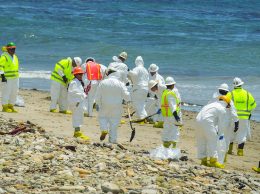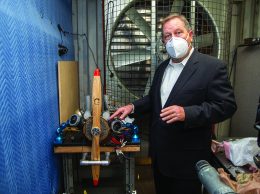Venoco’s Ellwood pipeline approved
Venoco said Sept. 12 that it has received final approval to build an 8.5-mile pipeline to transport crude oil from its South Ellwood field, off the coast of Goleta, to the shore.
“After almost three years in the permitting process, we are very pleased to announce we are ready to begin construction of this pipeline, which will eliminate the use of the barge,” Tim Marquez, chairman and CEO of the Denver-based oil and gas company, said in a news release.
Venoco currently uses a barge to transport oil between the rig and land, but the method costs more and has a higher risk of oil spills, it has said.
Environmental groups in the area have also supported the pipeline proposal. “We and our clients definitely believe that pipeline transport is safer than barging,” Linda Krop, chief counsel for the Santa Barbara-based Environmental Defense Center, told the Business Times in April. Her firm represents four area environmental groups.
The pipeline will connect Platform Holly to an existing pipeline near Los Flores Canyon on the Gaviota coast, where the oil would join crude from several other offshore rigs. “It’s just a better way of transporting crude — we don’t need land, we don’t need the barge, and we don’t need the contract with the barge operator,” Venoco spokeswoman Lisa Rivas told the Business Times in April.
Marquez said in the Sept. 12 statement that the pipeline allows Venoco to add at least 7 million barrels of reserves not currently recognized by its independent reserve engineers. “Once we have the pipeline in service and new contracts in place, we expect to realize $5 to $7 per barrel more on the approximately 2,000 barrels per day of production from our South Ellwood field. This is due to reduced transportation costs and a greater number of refineries to which we can market our crude oil,” Marquez said.
Venoco also updated its forecast of capital expenditures for 2011 from $200 million to $250 million, which includes costs associated with the construction of the pipeline as well as retaining drilling rigs in its West Montalvo field, and in the Sacramento Basin. The expenditures aren’t expected to impact 2011 production but would kick in next year, the company said.
Publicly traded Venoco is also involved in a legal battle with shareholders over a proposal by Marquez to buy the half of the firm he doesn’t already own, thereby taking it private. The $770.2 million proposed deal is a 39.2 percent premium over the company’s Aug. 26 share price, but a 9 percent discount over its June 30 total assets.
Two days after Venoco announced the proposed offer from Marquez, shareholder James G. Prince filed suit in Delaware Chancery Court to stop the proposal, saying the CEO’s offer undervalues the company. Prince also asked that the case be considered a class-action suit.
Venoco shares closed down 0.2 percent to $10.68 on Sept. 12 after news of the pipeline approval.
[wikichart align=”center” ticker=”VQ” showannotations=”true” livequote=”true” startdate=”13-03-2011″ enddate=”13-09-2011″ width=”390″ height=”245″]











